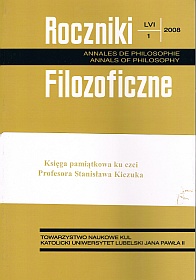The Concept of the Personalistic Metahysics of Borden Parker Bowne
Abstract
Borden Parker Bowne was the founder of the School of Philosophy in Boston, taught there for more than a generation, and made a lasting impression on American philosophy. During Bowne’s career at Boston University (from 1876 until his death 1910), many of his students, who later also became professors in different areas, were inspired by his thinking and his person.
His basic conviction is that it is the human person that is at the basis of Ontology and Ethics : the person that preserves its identity within change thanks to memory; the person that is active in knowing and choosing; the person that acts deliberately towards values; the person that thinks – all these at least potentially.
The purpose of the article is to examine Bowne’s metaphysics, i.e. the roots of his view of Personalism. What emerges is his idea of existence in general and of human existence in particular. This is done also historically, by examining some earlier views of man and reality in general, which were the background for Bowne’s specific ideas.
He begins from his idea of existence as active and self-determining, and of nature as activated by the intellect and will of God, the Most-High Person. That is why the human person has the attributes of awareness and self-awareness, freedom and the ability to act, and self-control.
The connection of Bowne’s Personalism with idealism also presents the problem of how do we come to discover the notion of person, which is not from simple experience of reality, but is rather developed or postulated. For Bowne the model for the notion of person is the Person of God. If we look at reality from the perspective of God-Person (Person par excellence), there is the danger of theologizing Philosophical Anthropology, and a reality of Bowne’s metaphysics, which wasn’t very popular among many philosophers.
Nonetheless Bowne’s ideas were positively received by the Church in America, and were used for many years as the model for defending the Christian world-view against the attacks of naturalism. In that context, his Personalism effectively fulfilled its role, showing the human person to be a spiritual being, ultimately coming from God, the Most-High Person.
References
Bertocci P. A.: Borden Parker Bowne and His Personalistic Theistic Idealism, [w:] P. Deats, C. Robb (eds.), The Boston Personalist Tradition in Philosophy, Social Ethics, and Theology, Macon, Ge.: Mercer University Press 1986.
Bowne B. P.: Metaphysics: A Study in First Principles, New York 1898.
Bowne B. P.: Personalism, Boston–New York 1906.
Bowne B. P.: Personalizm, Lublin 1994.
Bowne B. P.: The Immanence of God, Boston–New York 1905, repr. AMS 1979.
Bowne B. P.: The Speculative Significance of Freedom, [w:] E. W. Steinkraus (ed.), Representative Essays of Borden Parker Bowne, New York 1981.
Bowne B. P.: Philosophical Idealism, [w:] E. W. Steinkraus (ed.), Representative Essays of Borden Parker Bowne, New York 1981.
Bowne K. M.: An Intimate Portrait of Bowne, „The Personalist” 2 (1921).
Brightman E. S.: Personalism, [w:] V. Ferm (ed.), A History of Philosophical Systems, New York 1950.
Buckham J. W.: Borden Parker Bowne: Personalist, „The Personalist” 5 (1924).
Buford Th. O.: Klasyczny personalizm amerykański, „Personalizm” 3 (2002).
Burrow R.: Personalism a critical introduction, St. Louis 1999.
Copleston F.: Historia Filozofii, t. IV, Warszawa 2005.
Copleston F.: Historia Filozofii, t. VIII, Warszawa 1989.
DeWolf L. H.: Personalism in the History of Western Philosophy, „The Philosophical Forum” 12 (1954).
Gacka B.: Personalizm amerykański, Lublin 1996.
Gilson E., Langan Th., Maurer A. A.: Recent Philosophy Hegel to the Present, New York: Random House 1966.
Knudson A. C.: The Philosophy of Personalism, New York–Cincinnati–Chicago: The Abingdon Press 1927.
Langan H. E.: The Philosophy of Personalism and Its Educational Applications, Washington, D. C.: The Catholic University of America 1935.
Leibniz G. W.: Przedmowa, [w:] tenże, Nowe rozważania dotyczące rozumu ludzkiego, t. I, Warszawa 1955
Loemker L. E.: Some Problems in Personalism, [w:] Th. O. Buford, H. H. Oliver (ed.), Personalism revisited. Its Proponents and Critics, Amsterdam–New York 2002.
Personalism, [w:] The Cambridge Dictionary of Philosophy, ed. R. Audi, Cambridge 1999, s. 661.
Personalismus, [w:] Philosopisches Wörterbuch, hrsg. von H. Schmidt, G. Schischkoff, Stuttgart 1991.
Personalismus, [w:] Wörterbuch der philosophischen Begriffe, hrsg. von A. Regenbogen, U. Meyer, Hamburg 1998, s. 490.
Personnalisme, [w:] Encyclopédie de la Philosophie, ed. J. Montenot, Librairie Générale Française 2002, s. 1242-1243.
Steinkraus W. E.: Preface, [w:] tenże (ed.), Representative Essays of Borden Parker Bowne, New York 1981.
Theunissen M.: Personalismus, [w:] Historisches Wörterbuch der Philosophie, Bd. 7, Basel 1989, s. 339.
Watts Cunningham G.: The Idealistic Argument in Recent British and American Philosophy, Freeport–New York 1933 (1967 – reprinted).
Copyright (c) 2008 Roczniki Filozoficzne

This work is licensed under a Creative Commons Attribution-NonCommercial-NoDerivatives 4.0 International License.





